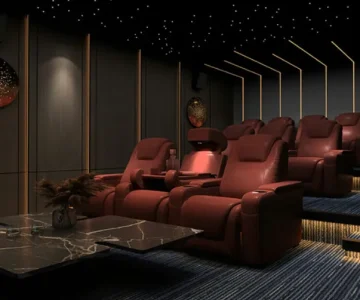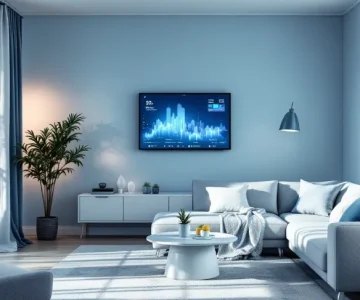Creating a home cinema is no longer a far-off dream—it’s a reality many are bringing into their living rooms, thanks to impressive leaps in entertainment technology. From the early attempts in the mid-20th century to recreate the magic of movie theaters at home, the evolution has been remarkable. Today, whether you’re an occasional movie watcher or a full-fledged film enthusiast, you have plenty of options for building the perfect setup.
One of the biggest choices you’ll face is deciding between a television and a projector screen. Both have their advantages, and the right pick depends on your room size, budget, and the kind of viewing experience you want.
The Case for TVs
Advantages
- Quick and Easy Setup – Modern TVs are designed for plug-and-play convenience, letting you start watching almost instantly without complex installation steps.
- Lower Initial Cost – Many TVs are more budget-friendly than projector setups, especially when you factor in the lack of bulb replacements or special screens.
- User-Friendly Controls – Simple remotes and intuitive menus make adjustments easy, whether you’re connecting to a streaming device, soundbar, or gaming console.
- Strong Image Quality – Thanks to LED and OLED advancements, TVs offer vivid colors, sharp detail, and deep contrast that look stunning, particularly in dark rooms.
- Smart Features – Built-in streaming apps, Bluetooth connections, and smart home integration add flexibility and convenience.
Drawbacks
- Limited Size – Even the largest consumer TVs rarely match the huge scale of projector screens.
- Viewing Angles – Picture quality can diminish if you’re sitting too far off to the side.
- Pixel Density on Large Screens – Very large TVs may lose some sharpness compared to smaller screens of the same resolution.
The Case for Projectors
Advantages
- Massive Screens – Projectors can create images well over 200 inches, bringing a truly cinematic feel to your space.
- Impressive Picture Quality – Many modern projectors deliver 4K resolution and HDR, making for crisp, lifelike visuals.
- Great Viewing Angles – Everyone in the room gets a clear view, no matter where they’re seated.
- Better Value per Inch – While the upfront cost may be higher, you get a much larger display for the price compared to TVs.
- Flexible Setup Options – Ceiling mounting, shelf placement, or retractable screens make projectors adaptable to many room types.
Drawbacks
- More Complex Installation – Getting the right placement, distance, and calibration can take time and effort.
- Maintenance Needs – Some projectors require periodic bulb replacements, adding to long-term costs.
- Brightness Limitations – Without proper light control, the image may wash out in bright rooms unless you use specialized screens.
Boosting the Home Cinema Experience
If your room isn’t pitch-black, an ambient light-rejecting screen can help preserve brightness and color accuracy.
For small spaces, Ultra Short Throw (UST) projectors can produce huge images from just inches away, making them ideal for apartments or multipurpose rooms.
If you want a flexible setup, a motorized projector screen that disappears when not in use can free up living space while keeping the cinematic option ready.
Don’t overlook sound quality—a Dolby Atmos system can make you feel like you’re part of the action, and comfortable seating can transform long movie nights into pure enjoyment.
Final Thoughts
Whether you choose a TV or a projector screen comes down to your priorities. A TV is straightforward, reliable, and budget-friendly, while a projector offers a larger-than-life experience that comes closer to the magic of the cinema. Either way, the right choice will turn your home into a place where every movie night feels special.





